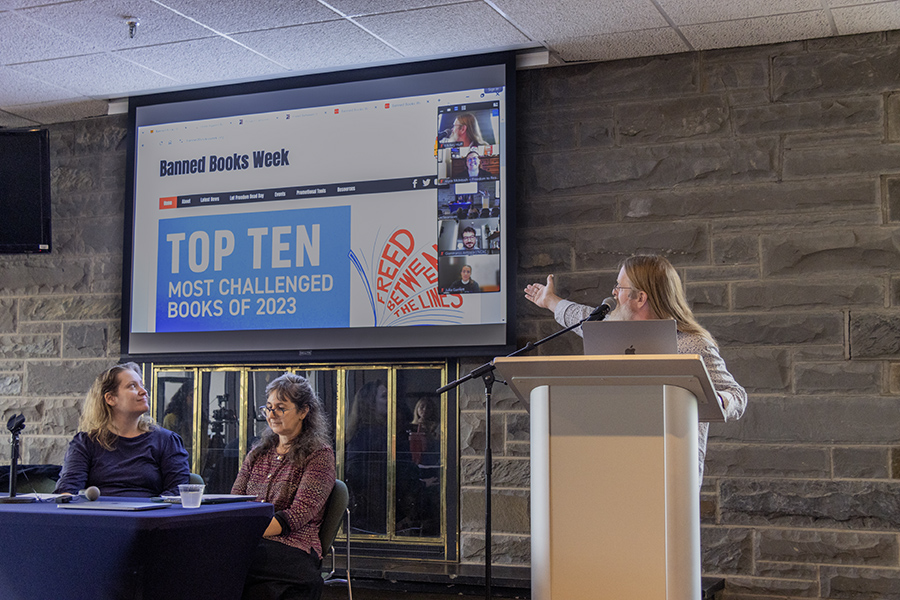As the U.S. experiences a wave of increasing book challenges and bans, members of Ithaca College and greater Ithaca communities gathered Sept. 24 in the Clark Lounge to listen to a panel discussion on censorship and intellectual freedom for National Banned Books Week.
Mickey Huff, distinguished director of the Park Center for Independent Media and professor in the Department of Journalism, hosted panelists from the college and national organizations that advocate for intellectual freedom.
Judith Krug, former director of the American Library Association’s Office for Intellectual Freedom, founded Banned Books Week in 1982 in response to an uptick in book bans. Banned Books Week 2024 runs from Sept. 22–28 and focuses on the theme “Freed Between the Lines.”
Huff started the panel by noting that Banned Books Week increases public awareness of censorship and encourages people to protect access to books.
“Banned Books Week celebrates the right to read,” Huff said. “It particularly celebrates your right as a student … to have access to different perspectives and different reading materials without outside interference of censors.”
Joyce McIntosh, assistant program director of the Freedom to Read Foundation at the American Library Association, said the U.S. has seen an alarming increase in book challenges since 2020. Book challenges are attempts to remove books from classrooms and libraries. Book bans occur when books are actually removed.
McIntosh cited a report from the ALA’s Office of Intellectual Freedom, which showed that the office recorded an average of 343 challenges per year from 2010–19. The OIF recorded 729 challenges spanning 1,597 book titles in 2021; 1,269 challenges spanning 2,571 titles in 2022; and 1,247 challenges spanning 4,240 books in 2023.
The OIF website notes that these statistics reflect only the challenges reported to the agency or covered in the media and do not include cases of soft censorship, when libraries purchase books but restrict access or hide them.
McIntosh said local, county, state and federal governments have attempted to restrict students and community members’ legal right to seek information from school and public library books.
“Our government sets aside our public libraries for one purpose, and that is for each American citizen to be able to access information from birth until death,” McIntosh said. “Students have that First Amendment protection to access information as well. Their rights are not removed when they walk in the classroom door.”
Panelist Jennifer Spitzer, associate professor in the Department of English, said book bans often target topics that individuals or groups consider to be dangerous, including LGBTQ+ identities, BIPOC individuals’ experiences with racism and discrimination and women’s sexuality. The ALA reports that 47% of the books targeted for censorship in 2023 centered on BIPOC and LGBTQ+ people’s experiences.
Spitzer said many individuals and groups who push for book bans say they are trying to protect children and ensure books are age-appropriate. However, she said she believes most book bans are actually motivated by desires to control what topics can be discussed in the U.S.
“Books that have been banned are banned because they have meant something to people,” Spitzer said. “They start conversations. They reflect on difficult and unflattering parts of our history … and they make us think and feel.”
Spitzer said students in her banned books course often can identify with challenged texts or can learn about things they did not explore in school, like sexual health.
“Students deserve to see their own experiences affirmed and represented, as much as they need to be exposed to people with different points of view and different ethnic, racial and religious backgrounds,” Spitzer said. “Banned books help us approach difficult subject matter while destigmatizing the experiences we are told to be silent about.”
Communications librarian Cathy Michael said the college’s library has held Banned Books Week events since 2013, and the events have become increasingly important as book challenges increase.
Michael said censorship censorship extends beyond different types of media like blogs, articles, photos and music have been challenged.
“Have I experienced book banning?” Michael said. “Not so much in the collegiate sphere. But what I am doing is speaking out for public librarians and school librarians, who have more at stake. A lot of them are undergoing a lot of name calling and having books removed and their jobs are at stake.”
Gianmarco Antosca, Youth Free Expression Program coordinator at the National Coalition Against Censorship, said as book challenges have increased, there are too many for the NCAC to offer direct support or advocacy for each individual instance of book challenges or bans.
“The soft censorship, the kind of chilling speech that we’re seeing, it’s a lot harder to address it head on,” Gianmarco said. “It’s become so important to identify advocates, people in their communities to support them. Those are the people that are actually really changing the culture.”
Julia Garnett, a first-year student at Smith College and the youth honorary chair of Banned Books Week, said there are several barriers to activism for young people and it is critical that leaders include them in discussions and decisions about book review and book banning.
“[By] enabling students to go out to school boards, to use their voices on social media platforms, [write] letters to your state legislature, things like that, we need to make sure that high school students feel heard,” Garnett said. “It’s so, so important, especially at the high school level, to have students represented because we are the ones reading these books.”
Huff closed the panel by encouraging attendees to read and share banned and challenged books. The library organized an event encouraging students to have a “blind date” with a banned book from Sept. 22–28.
“Reading is literally an exercise in liberation and censorship has no place in that vital process,” Huff said. “As citizens of a free society, we must speak out against the suppression of ideas, identities and ideologies that challenge the status quo. The evolution, and perhaps survival of our democratic republic, demands it.”










